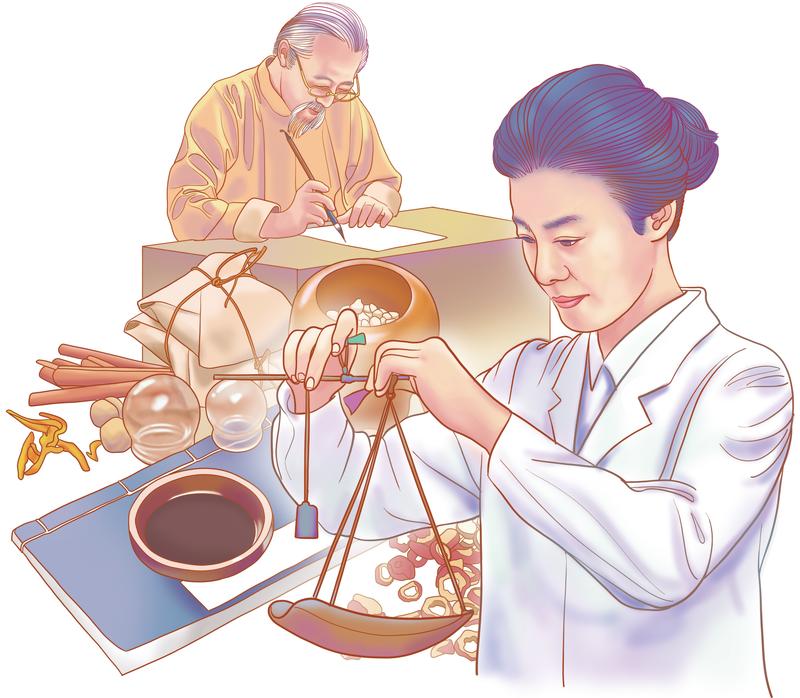 (JIN DING / CHINA DAILY)
(JIN DING / CHINA DAILY)
The history of medicine is the history of human beings — to be precise, human beings' fight against diseases, including epidemics such as the plague. In the thousands of years of human history, people around the world have suffered many epidemics, which have claimed millions of lives.
Chinese history also witnessed horrors of wars, famines and epidemics in ancient China. And traditional Chinese medicine has played a key role in battling epidemics throughout history, proving its safety and efficacy.
Carrying the precious academic theories and clinical experiences of our ancestors, TCM has withstood the test of time, and become an effective mode of medical treatment. And TCM needs both experience and innovation to further improve and provide better treatment for the people
TCM's theories and practices to contain epidemics have been refined and improved. In fact, TCM provided ample protection against the COVID-19 pandemic and helped treat the infected. TCM's safety and efficacy have been proved once again during the pandemic.
Following the easing of the pandemic prevention and control measures in China, the number of people infected by the novel coronavirus has increased sharply. But since the variants and sub-variants of the virus are becoming more infectious but less lethal after three years of mutations, most families can withstand the wave of the outbreak.
More people are opting for home quarantine (which the government, too, has advised) after contracting the virus. As such, TCM will continue to serve the people well against COVID-19.
Yet there is an ongoing debate over the efficacy of TCM compared with Western medicine. First, there are differences between TCM and Western medicine in terms of understanding, diagnosis and prognosis. In short, TCM believes in holistic treatment, while Western medicine tends to treat the symptoms.
Therefore, to treat a highly contagious disease, Western medicine mainly focuses on the virus and antiviral treatment. On the other hand, TCM starts with the symptoms that patients show and then treats the disease. TCM also takes into consideration the climate conditions and environment in which people live, as they influence their health, and then diagnoses the cause of the illness.
Taking a holistic view, TCM coordinates prevention, treatment and recuperation from the very beginning. TCM also believes medicinal herbs change with weather, seasons so to say, and geography, and their impact is different on different individuals — depending on their age and health condition.
The idea of treatment in TCM and Western medicine, too, is different. Rather than using some compositions of chemical drugs to treat a disease or kill bacteria or viruses, TCM tries to reduce the symptoms and strengthen the patient's natural immune system to fight, for example, an invading virus.
Many herbs and patent Chinese drugs have been effectively used to prevent and cure an epidemic disease. TCM works entirely on its own, without the aid of Western medicine, to contain a virus.
Second, used properly, TCM doesn't have any side effects, meaning it doesn't produce toxins that can damage the liver or other organs. Taking the human body as an organic whole, TCM redresses the natural imbalance.
Although some herbs contain ingredients that affect the liver, the mixture of herbs TCM uses works together to create synergy and reduce toxicity. For instance, the herbal medicine aristolochia contains aristolochic acid that can affect the liver, but with syndrome differentiation and reasonable prescription, the herb can effectively treat cough caused by lung heat, asthma, hemorrhoids and high blood pressure. And for liver and kidney damage caused by other drugs, TCM can heal the sick.
Besides, whether a drug is toxic or not depends not only on the nature of the drug but also on the dose, prescription, disease and the overall health condition of the person having it.
Third, thousands of years' practice has enriched TCM. By passing on the essence and taking in new ideas to make up for the shortfall, TCM continues to develop.
TCM theories and classic prescriptions both are significant. Innovation, too, is important, but innovation should be based on experience.
Carrying the precious academic theories and clinical experiences of our ancestors, TCM has withstood the test of time, and become an effective mode of medical treatment. And TCM needs both experience and innovation to further improve and provide better treatment for the people.
The author is president of Fujian University of Traditional Chinese Medicine.
The views don't necessarily reflect those of China Daily.


